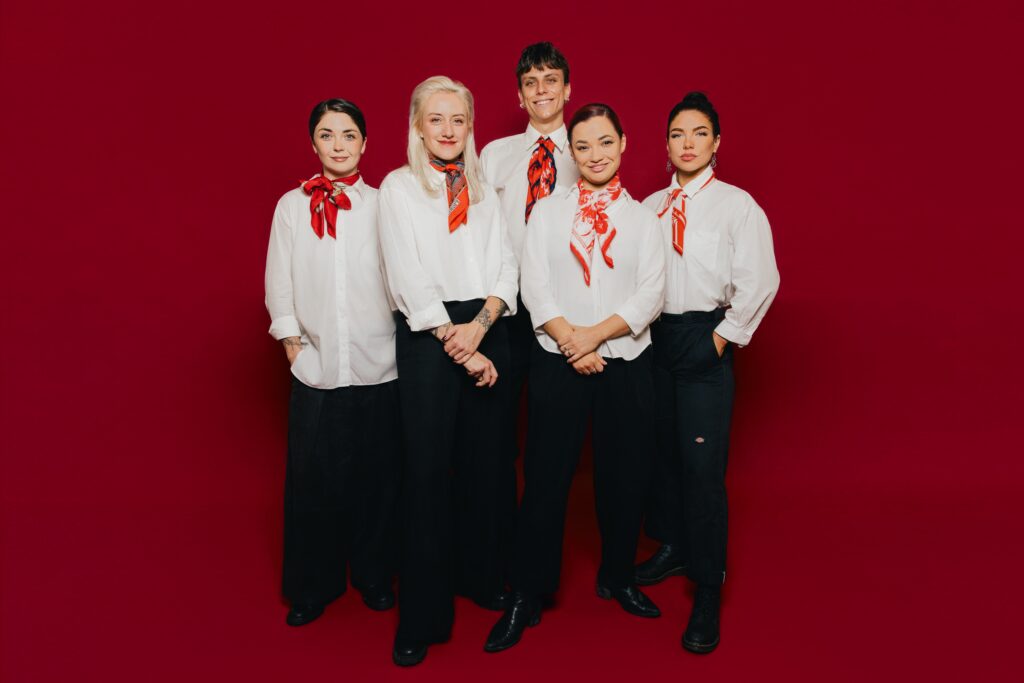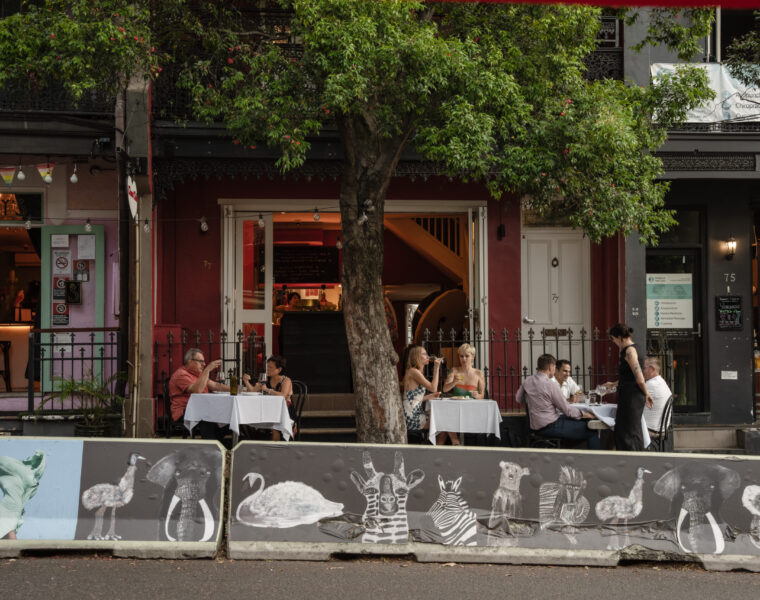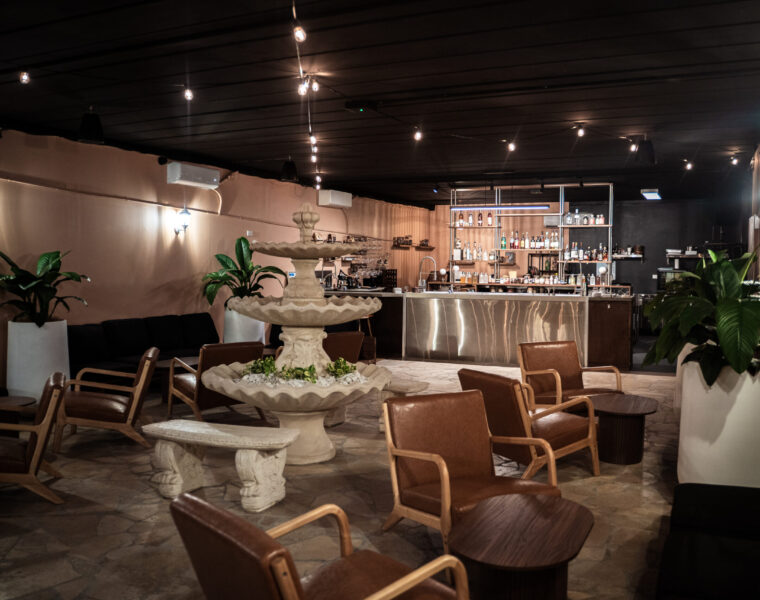
With the latest round of revelations about foul and illegal behaviour being recently aired by Nine Media, editor Kim Berry talks to Sorry Not Sorry co-founder, Jenna Hemsworth, about how the hospitality sector can find meaningful change.
Photography by Anna Hay
The hospitality industry is in a state of introspection, again. The latest reports and allegations into Merivale and Icebergs follow those revealed by The Sydney Morning Herald in October last year, which set off a chain of events that may well see real change take place. When the SMH published allegations against hospitality group, Swillhouse, last year, a group of former employees created the Sorry Not Sorry Collective to raise funds for legal action against their former employer. But it quickly became much more than that.
Founded by award-winning bartenders Rachelle ‘Rocky’ Hair and Jenna Hemsworth, and joined by Britt Row, Reuben Kahl, and Alex Hooker, Sorry Not Sorry escalated into what is now a global movement for safe and inclusive workplaces and a raised industry-wide consciousness to call-out, challenge, and eradicate abuse, discrimination, and inequality in the sector.
What systemic changes do you believe are most urgently needed to protect hospitality workers from harassment and assault?
The themes we are seeing time and time again not only across Australia, but now globally, includes a severe lack of representation in upper management positions, and that has a direct flow on effect to staff experience.
When no one in upper management represents or reflects the experiences of their employees (gender diverse, BIPOC, sexuality, religion etc), the likelihood they will identify and understand the issues affecting staff is diminished and the likelihood of poorly handling incidents and dynamics is increased.
Even when we see companies seemingly champion a new “token” woman in a position of power, it seems performative at best and dangerous at worst because often these appointments have been made for the wrong reasons.
Staff safety and employee wellbeing should always lead these conversations.
We have found that the overwhelming majority of perpetrators of assault within workplaces are other staff members, most often in positions of power or authority over their victims.
How can your staff feel safe, empowered, and motivated to come forward with an issue, if the person they are meant to report it to is statistically the most likely person to have caused the issue in the first place?
The need for external HR without a vested interest in the company is a great start here, and even better if they can cross reference venues within a larger area. We are seeing a concerning trend of perpetrators being moved around venues or between companies to sweep issues, assaults, or predatory behaviour under the rug.
There also must be greater protection for people brave enough to come forward with their stories. Most workers in the industry aren’t fully aware of their rights or, because of the high number of casual, immigrant, and transient workers in the industry, don’t have protections at all. The likelihood of these people coming forward and risking job security or sponsorship is low, which also makes them likely targets for exploitation.
“Diverse and inclusive workplaces should represent their workers starting from representation in upper management. Never underestimate the power of lived experience. If you can’t see the issue, it may be because it doesn’t exist for you, but that isn’t the case for everyone.”
How can hospitality businesses and industry leaders better support survivors and create safer work environments?
Trauma informed responses to issues raised to upper management or HR can be instrumental in ensuring the safety and wellbeing of those affected by workplace harassment or assault.
Taking accountability for any issues that may have occurred, publicly acknowledging any shortcomings and regaining the trust of your employees and the wider community that you are ready and willing to face these issues head on and work to actively make change.
Providing extra support and services for victims, ensuring they have the resources they need.
Welcome external services such as HR, unions, or governing bodies into your establishments. Offer full transparency. If you have nothing to hide, these measures shouldn’t be unwelcome – and it goes a long way in making your staff feel confident that they are protected.
Place women or minorities in decision making positions in your company, and not just to look good or feel good. Diverse and inclusive workplaces should represent their workers starting from representation in upper management. Never underestimate the power of lived experience. If you can’t see the issue, it may be because it doesn’t exist for you, but that isn’t the case for everyone.
Keep speaking out and believing victim survivors. I cannot express how taxing it has been for us to have to lead the way in this movement, but we do it in the hopes that in the future no one else has to. Breaking that taboo and ensuring that victims no longer suffer in isolation means we can rely on our strength in numbers. Abusers rely on fear, intimidation, and isolation in their victims to keep them silent. We’re speaking out and holding them accountable in the hopes that people fear the repercussions of their actions moving forward.
What role do you see for policymakers, other workers, and the public in supporting your advocacy efforts?
Rocky and I are working closely with the NSW government, specifically both the Nightlife and Women’s Safety Commissioners, sharing our experiences and shining a light on what may otherwise be blind spots in their awareness of the issues we face daily. They have all been incredibly receptive to our stories, feedback and advice and we continue to work with other governing bodies, unions and advocacy groups to share information and combine resources to start implementing real change.
As for other workers and the general public, I’ve said this before many times but accountability starts with transparency and we need to ensure that we are sharing information, calling people out for their behaviour, even when they are your mates, and refusing to support businesses that do the wrong thing are all great steps that are able to be implemented in your day to day lives.
Use your money as you would your vote and spend with your values.
What has helped you all stay resilient and united in the face of such difficult experiences?
It is hard to focus on your own discomfort when you are constantly hearing stories of other people’s ongoing experiences and traumas. We are doing this for those who don’t have the resources, bandwidth, or ability to do it for themselves. I’m not going to pretend it’s easy, it is a constant reminder of the worst part of the industry we all love so much, but seeing the effect what we are creating is having on the new generation of hospitality workers really puts it in perspective.
We’re also in this together, hold each other accountable when we’re not at our best, and make sure we’re all crossing that finish line together.
What began as a way to support each other has become a worldwide movement for change. I’m not going to pretend it’s easy, it is a constant reminder of the worst part of the industry we all love so much, but seeing the effect what we are creating is having on the new generation of hospitality workers really puts it in perspective.
What began as a way to support each other has become a worldwide movement for change.










